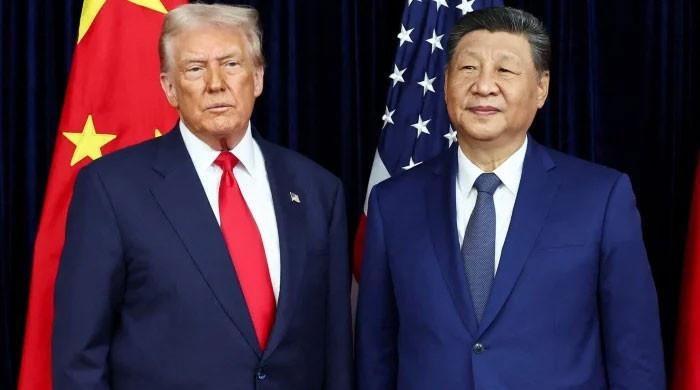Biden to nominate Pakistani-origin Silicon Valley critic Lina Khan to head US FTC
'So very honored and humbled by this nomination' from US President Joe Biden, Lina Khan says
March 23, 2021
WASHINGTON: US President Joe Biden announced late Monday his intention to nominate the Pakistani-origin critic of 'Big Tech' and Silicon Valley, Lina Khan, to head the Federal Trade Commission (FTC) — an agency with authority over some mergers and antitrust policies.
A graduate of the Williams College and Yale Law School, Lina Khan is a legal scholar specialising in competition and antitrust law.
Khan — who is currently the associate law professor at the Columbia Law School — has previously worked for the Democratic members of the US House of Representatives Judiciary Committee.
"Today, President Joe Biden announced his intent to nominate Lina Khan for Commissioner of the Federal Trade Commission," the White House said in a statement issued Monday night.
At the Columbia Law School, Lina Khan "teaches and writes about antitrust law, infrastructure industries law, and the antimonopoly tradition", it added.
'Honored and humbled'
As a counsel to the US House Judiciary Committee's Subcommittee on Antitrust, Commercial, and Administrative Law, "she helped lead the Subcommittee’s investigation into digital markets", the statement said.
The Subcommittee had last year released a lengthy report suggesting grounds for breaking up giants such as Facebook, Google, Amazon, and Apple.
"So very honored and humbled by this nomination," she wrote on Twitter.
"Excited to get to work if I’m fortunate enough to be confirmed!"
If elected to the position, the Pakistani-origin scholar would become the FTC's third Democratic commissioner overseeing privacy and data security.
The current acting chairperson for the FTC, Rebecca Kelly Slaughter, lauded Lina Khan on her nomination and highlighted her "creative energy, groundbreaking antitrust work, and passion for the FTC’s mission".
Last week, Slaughter had suggested heightened antitrust scrutiny, including the digital economy. "The increasing presence of large technology companies in our daily lives and in our economy animates recent calls for antitrust reform," she had told a congressional panel.
Biden to take on 'Big Tech'
Joe Biden's nod to a prominent advocate of breaking up 'Big Tech' firms suggests an aggressive posture on antitrust enforcement, with the move following the naming of Tim Wu — another 'Big Tech' critic — to an economic advisory post in the White House.
"Happy to say I'm joining the Biden White House to work on Technology and Competition Policy at the National Economic Council. Putting this Twitter feed on hold for now -- so long," Tim wrote on Twitter.
In 2017, Lina Khan authored a paper called "Amazon's Antitrust Paradox," which outlined the growing dominance of the e-commerce and tech giant, which some say helped shift sentiment on antitrust.
Khan has earlier worked in the office of FTC member Rohit Chopra and was a legal director at the Open Markets Institute, a think tank that has been highly critical of the Silicon Valley giants.
The news comes amid a growing backlash against tech behemoths that have dominated key economic sectors and seen their influence grow during the coronavirus pandemic.
Utah Senator unhappy with Khan's experience
The move is likely to trigger a contentious nomination fight, with some Republicans already expressing opposition to Khan.
Utah Senator Mike Lee said earlier this month that "being less than four years out of law school," Khan "lacks the experience necessary for such an important role as FTC Commissioner."
"Her views on antitrust enforcement are also wildly out of step with a prudent approach to the law", Lee added, noting that her appointment "would signal that President Biden intends to put ideology and politics ahead of competent antitrust enforcement."
'Consumer welfare'
But Charlotte Slaiman of the consumer advocacy group Public Knowledge welcomed the news, saying earlier this month that Khan's appointment "will signal that antitrust enforcement and important competition policy changes will be a high priority."
Lawmakers and policymakers in recent years have been mulling the decades-old "consumer welfare" standard of antitrust enforcement, which allows for a largely hands-off approach for big firms as long as prices are not impacted.
Critics say this approach has allowed 'Big Tech' firms to grow unchecked with unprecedented power over key sectors of the economy.
—With additional input from AFP











